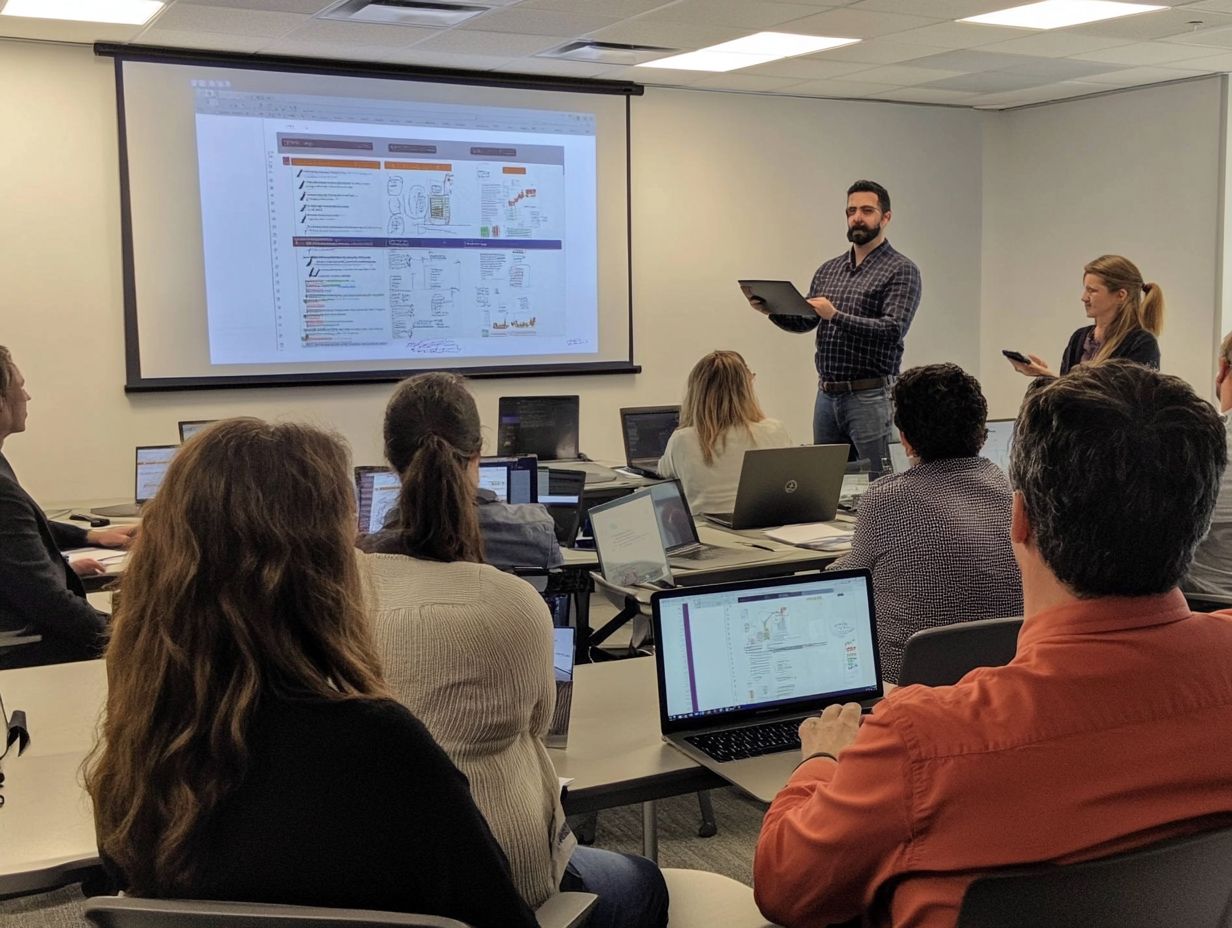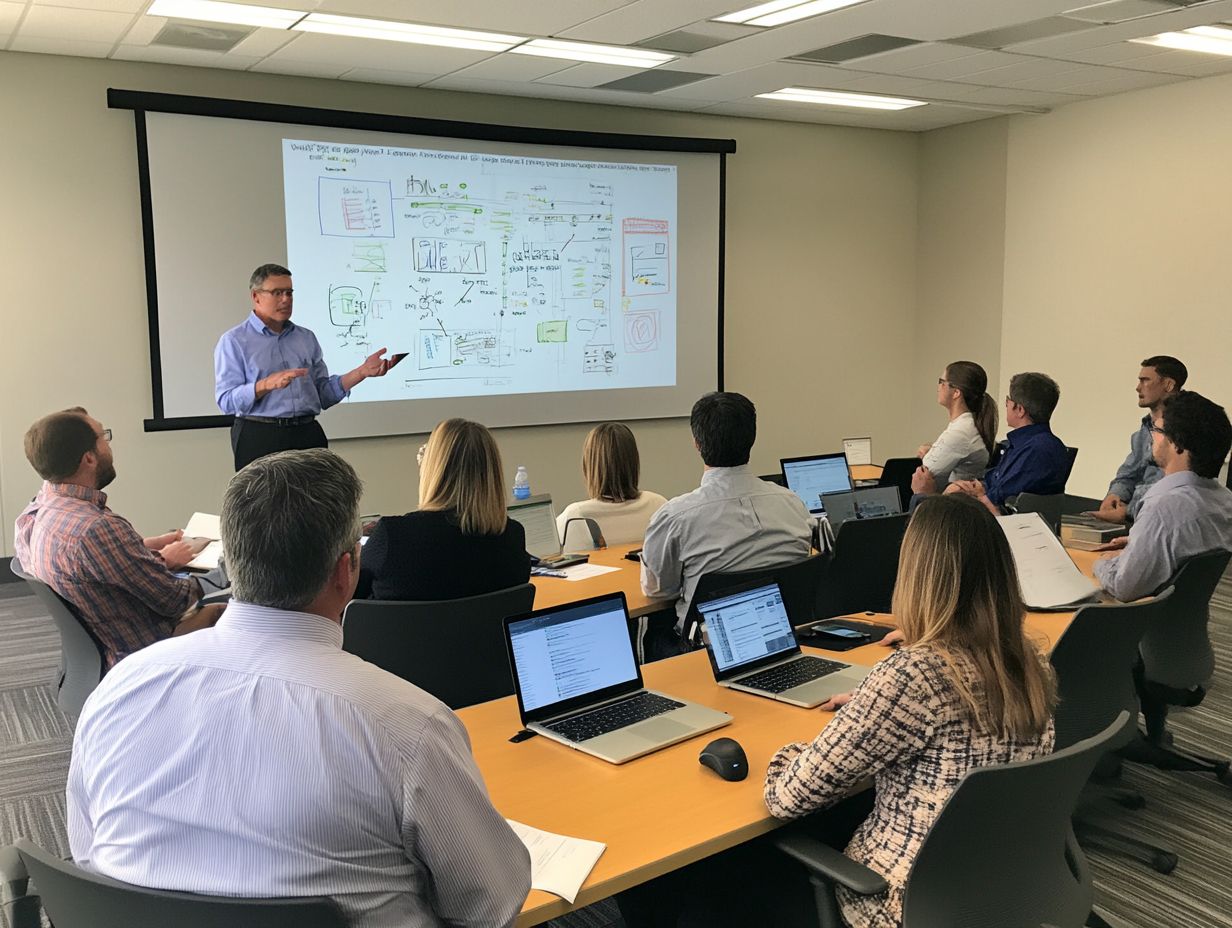Top 10 Project Management Certifications for 2024
In today’s competitive landscape, getting a project management certification can significantly elevate your career prospects and expand your skill set. With many options available, selecting the right certification might feel a bit overwhelming.
Let s explore the top 10 project management certifications for 2024, featuring the esteemed PMP and CAPM, alongside specialized credentials like Certified ScrumMaster and PRINCE2. Don’t miss out on these opportunities!
Delve into the benefits, key knowledge areas, and preparation strategies for each certification. This will empower you to make an informed decision about advancing in the world of project management.
Contents
- Key Takeaways:
- 1. Project Management Professional (PMP)
- 2. Certified Associate in Project Management (CAPM)
- 3. PRINCE2 Certification
- 4. Certified ScrumMaster (CSM)
- 5. CompTIA Project+
- 6. Certified Project Manager (CPM)
- 7. Agile Certified Practitioner (PMI-ACP)
- 8. Certified Project Management Practitioner (CPMP)
- 9. Certified Project Director (CPD)
- 10. Certified Project Management Professional (CPMP)
- What Are the Benefits of Obtaining a Project Management Certification?
- Frequently Asked Questions
- 1. What are the top 10 project management certifications for 2024?
- 2. Why are these certifications considered the top 10 for 2024?
- 3. What is the PMP certification and why is it ranked as the top certification for 2024?
- 4. Are there any prerequisites for these certifications?
- 5. How can I prepare for these certifications?
- 6. How long is the validity of these certifications?
Key Takeaways:

PMP, CAPM, PRINCE2, CSM, and top 5 healthcare certifications for 2024 are the leading certifications this year. They teach essential skills like project planning and risk management that are crucial for success. Getting a project management certification can advance your career by demonstrating expertise and increasing job opportunities and salary potential.
1. Project Management Professional (PMP)
The Project Management Professional (PMP) certification, presented by the Project Management Institute (PMI), stands as a globally recognized benchmark for project management excellence. It significantly elevates your career prospects as a project manager across various industries.
This credential validates your skills and knowledge necessary for effectively leading and directing projects. It ensures you can manage teams, stakeholders, and resources while achieving project goals with efficiency.
By earning this certification, you not only gain a competitive edge but also showcase your commitment to industry standards and best practices. The PMP credential aligns with various ways to plan and execute projects, such as Agile, Waterfall, and PRINCE2, making it versatile for different project environments.
Getting this certification requires you to meet specific educational and experiential requirements, followed by passing a rigorous exam. To help you succeed, PMI provides a wealth of resources, including study guides, webinars, and networking opportunities, all designed to foster your professional development and growth within the field.
2. Certified Associate in Project Management (CAPM)
The Certified Associate in Project Management (CAPM) credential, governed by PMI, serves as your gateway to the world of project management. This entry-level certification provides you with a solid foundation in project management principles and practices.
By getting this certification, you expand your knowledge and significantly enhance your job prospects and professional credibility in a competitive market. It allows you to showcase your commitment to the field, making you a more attractive candidate for entry-level positions.
To qualify, you need to meet specific educational requirements and hold a secondary degree. It’s also advisable to complete 23 hours of project management education before you sit for the exam.
The topics you ll delve into include:
- Project lifecycle
- Risk management
- Stakeholder engagement
- Integration management
These subjects equip you with essential skills to manage projects effectively as you embark on your career.
3. PRINCE2 Certification
PRINCE2 (PRojects IN Controlled Environments) is a structured project management methodology that emphasizes organization and control. Its certification is an invaluable asset for you as a project manager eager to elevate your competencies in effective project management.
At its core, PRINCE2 revolves around seven principles, themes, and processes that guide you through a systematic approach to project delivery. This methodology promotes flexibility and adaptability while ensuring your projects can respond to changing conditions without compromising structure.
Unlike PMI’s frameworks, which often adopt a one-size-fits-all mentality, PRINCE2 allows you to tailor its application to diverse environments. Its international recognition makes it a preferred choice across various industries, as reflected in the widespread certification levels Foundation and Practitioner designed to cater to both newcomers and seasoned professionals.
As you navigate the complexities of real-world scenarios, these certifications equip you with the tools and knowledge needed to lead your projects with proficiency, ultimately ensuring successful outcomes.
4. Certified ScrumMaster (CSM)
The Certified ScrumMaster (CSM) certification equips you with essential skills to implement Scrum, an agile project management framework designed to promote flexibility and collaboration within your teams.
This transformative certification enhances your ability to facilitate effective Scrum practices and fosters a culture of continuous improvement and responsiveness to change. You will learn the core principles of agile methodologies through various training programs, mastering techniques that encourage team cohesion and iterative progress.
To earn this certification, you need to meet a few requirements:
- A foundational understanding of Scrum concepts.
- Completion of a workshop led by a Certified Scrum Trainer.
- Passing the certification exam.
Embracing agile practices leads to higher team productivity and enhanced stakeholder satisfaction, ultimately driving project success in today s fast-paced business landscape.
5. CompTIA Project+
CompTIA Project+ is a vendor-neutral certification that provides a thorough understanding of project management fundamentals. It is an ideal choice for validating your skills in managing small to mid-sized projects.
This credential emphasizes crucial elements of project management, such as planning, execution, and completion. It ensures that you are well-prepared to tackle the unique challenges in the IT landscape.
The certification process includes a well-structured exam designed to evaluate your competencies in key areas like project lifecycle management, stakeholder engagement, and risk assessment.
By passing this exam, you confirm your expertise and gain a competitive edge in the job market. Successfully obtaining this certification can significantly enhance your ability to collaborate effectively with teams and drive successful project outcomes, making it a valuable asset for your career advancement in the technology sector.
6. Certified Project Manager (CPM)

The Certified Project Manager (CPM) certification sets you apart in project management by thoroughly assessing your skills and knowledge in implementing effective practices.
This certification underscores your dedication to the field and elevates your credibility among peers and potential employers.
To achieve CPM status, you must meet specific educational and experience criteria, followed by challenging examinations that assess your understanding of various methodologies and tools essential to project management.
As you prepare for the certification, you will access a wealth of resources, including online courses, study groups, and official textbooks, which deepen your understanding of project management principles.
Earning this certification can greatly impact your career trajectory, opening doors to advanced positions and greater responsibilities within the industry. It underscores the significance of ongoing professional development.
7. Agile Certified Practitioner (PMI-ACP)
The PMI Agile Certified Practitioner (PMI-ACP) certification is tailored for project managers like you who embrace agile practices, validating your expertise in leading teams and managing projects in dynamic, fast-paced environments.
In today s world, where rapid change is the norm and adaptability is essential, the PMI-ACP focuses on fundamental agile methodologies that equip you to navigate complexities confidently. This certification highlights key concepts such as adaptive planning and iterative development while exploring frameworks and tools that elevate project delivery.
To get this credential, you must showcase your prior project management experience and complete agile training, underscoring its importance for your professional growth.
The advantages of earning this certification are significant, including expanded career opportunities and the ability to lead agile transformations within organizations. This ultimately distinguishes you in a competitive job market.
8. Certified Project Management Practitioner (CPMP)
The Certified Project Management Practitioner (CPMP) certification recognizes you as a professional with advanced knowledge and skills in project management, positioning you as a leader in the field.
In today’s competitive landscape, this certification is relevant. It equips you with essential tools to enhance project performance and improve your managerial skills.
To obtain the CPMP certification, you typically need a blend of formal education, hands-on experience in project management, and successful completion of a rigorous assessment process that evaluates your abilities across various project management areas.
Achieving this certification validates your expertise and enhances your career advancement opportunities. It sets you apart in the job market and opens doors to leadership roles that require skilled project management capabilities.
9. Certified Project Director (CPD)
The Certified Project Director (CPD) certification is for you if you oversee multiple projects and programs. It showcases your abilities in leading teams and driving project success on a grand scale.
This credential shows how important strategic thinking, comprehensive risk management, and resource optimization are for managing complex portfolios. Pursuing the CPD designation not only aligns with organizational standards but also deepens your understanding of project integration and stakeholder engagement.
The competencies validated by this certification such as leadership, emotional intelligence, and advanced communication skills are essential for propelling your career forward. This positions you as a valuable asset within your organization and significantly enhances your marketability in today s competitive job landscape.
10. Certified Project Management Professional (CPMP)
The Certified Project Management Professional (CPMP) is a prestigious certification for seasoned project managers, validating your expertise in navigating complex projects while ensuring optimal performance metrics.
This certification equips you with advanced ways of doing things and emphasizes your commitment to continuous professional growth. As industries evolve, holding the CPMP can significantly elevate your profile, showing a comprehensive understanding of both strategic and operational project management.
To earn this coveted certification, you must meet specific educational and professional requirements and pass a rigorous examination that assesses your knowledge and practical application of project management principles.
By achieving CPMP status, you enhance your resume and expand your career opportunities, making yourself more competitive in an increasingly crowded job market.
What Are the Benefits of Obtaining a Project Management Certification?
Obtaining a project management certification offers numerous benefits, including enhanced professional credibility, improved job opportunities, and the potential for significant salary increases that can greatly influence your career trajectory.
These advantages extend further, as certified professionals often gain access to networking opportunities that connect them with industry leaders and peers. Such connections can cultivate mentoring relationships and job referrals, significantly elevating your career prospects.
Certifications validate your skills and lead to improved project performance. Statistics indicate that certified project managers can reduce project costs by up to 20%.
A recent survey shows that certified project managers earn, on average, 20% more than their non-certified counterparts. This clearly illustrates that these credentials can open doors to advanced roles and higher salaries.
What Are the Key Skills and Knowledge Covered in These Certifications?

Key skills and knowledge areas encompassed in project management certifications include project scheduling, risk management, and business analysis. These competencies are essential for thriving in various project environments.
These competencies enhance your ability to manage timelines effectively while empowering you to identify potential risks early and devise robust contingency strategies.
For example, the PMP certification emphasizes structured methods and best practices. Meanwhile, the CAPM certification provides foundational insights tailored for entry-level roles.
The Agile certification focuses on iterative development and responsiveness to change. It highlights the importance of flexibility in today s fast-paced project landscape.
Each certification cultivates a unique set of skills directly applicable to real-world scenarios, such as navigating stakeholder conflicts or optimizing resource allocation. This makes them invaluable for anyone aiming to lead successful projects.
How Can These Certifications Help Advance a Career in Project Management?
Las certificaciones en gesti n de proyectos son activos invaluables para tu progreso profesional. Estas aumentan significativamente tu comercializaci n y abren el camino a nuevas oportunidades laborales en diversas industrias.
Cuando te certifiques, es probable que obtengas aumentos salariales sustanciales en comparaci n con tus compa eros no certificados. Una encuesta del Project Management Institute revela que los gerentes de proyectos certificados pueden ganar hasta un 25% m s que aquellos que carecen de certificaciones.
Los l deres de la industria comparten frecuentemente testimonios que destacan c mo sus certificaciones han acelerado promociones y ampliado responsabilidades.
Un gerente de proyectos coment que obtener una certificaci n no solo fortaleci su confianza, sino que tambi n lo posicion como un l der de confianza dentro de su organizaci n. Esto le permiti liderar proyectos exitosos y guiar equipos de alto riesgo.
Esta evidencia claramente muestra que invertir en certificaciones puede llevar a un gran crecimiento profesional.
What Are the Differences Between These Certifications?
The landscape of project management certifications is wonderfully diverse. Each certification presents unique focuses, methods, and requirements tailored to various levels of experience and professional aspirations.
Take the Project Management Professional (PMP) certification, for instance; it s highly regarded for its rigorous focus on comprehensive project management skills. To earn this prestigious certification, you ll need to meet specific educational criteria and demonstrate significant project leadership experience.
If you’re leaning towards agile practices, the Certified ScrumMaster (CSM) could be your ideal match. It requires minimal prerequisites, making it perfect for those looking to transition into roles that embrace agile practices.
The PRINCE2 certification offers a structured approach to project management. It distinguishes between Foundation and Practitioner levels, catering to both newcomers eager to learn and seasoned professionals seeking to deepen their knowledge.
By grasping these distinctions, you can make informed decisions that align with your career trajectory and the evolving demands of project management roles.
What Are the Requirements to Obtain These Certifications?
Each project management certification comes with its own set of specific requirements regarding education, experience, and examinations you need to fulfill to earn your certifications.
These criteria may vary, but they typically involve a blend of formal education in relevant disciplines and proven experience in managing projects. You also need to pass a thorough exam designed to assess your knowledge and skills.
For instance, some certifications might ask for a bachelor’s degree alongside a specified number of hours spent leading projects, while others may accept equivalent professional experience.
To navigate these prerequisites effectively, take the time to familiarize yourself with the specific eligibility guidelines outlined by the certifying body. Attending preparatory courses can be immensely beneficial, and gaining practical experience through internships or volunteer projects can significantly enhance your application.
Ready to elevate your project management career? Start exploring certification options today!
How Can One Prepare for These Certifications?
Preparing for project management certifications requires a strategic approach, which involves enrolling in training programs, diving into relevant study materials, and honing your skills with mock exams.
This well-rounded approach not only helps you grasp essential concepts but also boosts your retention of information.
You can take advantage of a variety of study materials specifically designed for the exam, such as:
- Textbooks
- Online courses
- Instructional videos that simplify complex topics
Joining study groups can enhance your learning experience. It allows you to share insights and clarify any doubts with peers.
It s also vital to get familiar with the certification format and exam content. Understanding the structure and types of questions can significantly bolster your confidence and improve your performance on test day.
Watch this video for tips on certification preparation!
Frequently Asked Questions
1. What are the top 10 project management certifications for 2024?

The top 10 project management certifications for 2024 are PMP, CAPM, PMI-ACP, PRINCE2, CSM, CompTIA Project+, IPMA Level A, AgilePM, PgMP, and PMI-RMP.
2. Why are these certifications considered the top 10 for 2024?
These certifications have been selected based on their popularity, industry recognition, and demand in the project management field. For those looking to advance their careers, the top 5 online educational certifications for 2024 are also expected to hold their relevance and value in the coming years.
3. What is the PMP certification and why is it ranked as the top certification for 2024?
The Project Management Professional (PMP) certification is recognized globally as the gold standard in project management. It is highly valued by employers and considered a measure of a project manager’s competence, experience, and knowledge in the field.
It is ranked as the top certification for 2024 due to its continued popularity and recognition in the industry.
4. Are there any prerequisites for these certifications?
Most of the top 10 project management certifications for 2024 require candidates to have a certain level of education, experience, and training, often utilizing top project management tools for certified professionals to enhance their skills.
For example, PMP requires a minimum of 35 hours of project management education and a certain number of hours leading and directing projects. It is important to carefully review the prerequisites for each certification before applying.
5. How can I prepare for these certifications?
There are various ways to prepare for these certifications, including self-study, online courses, and in-person training.
Choose a study method that fits your style and keeps you engaged! Using study materials like books, practice exams, and study groups can also help.
6. How long is the validity of these certifications?
The validity of these certifications varies, with most of them being valid for 3-5 years.
However, some certifications may require ongoing education or renewal to maintain their validity. It is important to check the specific requirements for each certification to ensure its validity.






